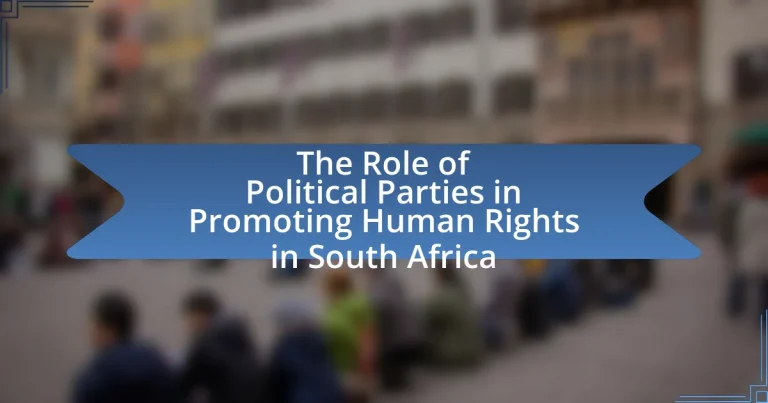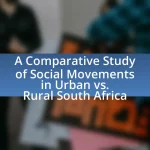The article examines the critical role of political parties in promoting human rights in South Africa, highlighting their influence on legislation, public advocacy, and citizen mobilization. It discusses how parties like the African National Congress (ANC), Democratic Alliance (DA), and Economic Freedom Fighters (EFF) address specific human rights issues such as racial and gender equality, freedom of expression, and access to education. The article also explores the challenges these parties face, including political fragmentation and corruption, as well as their collaborations with civil society and international organizations to enhance human rights advocacy. Additionally, it analyzes the impact of internal dynamics, leadership changes, and external factors on the commitment of political parties to uphold human rights within the South African context.
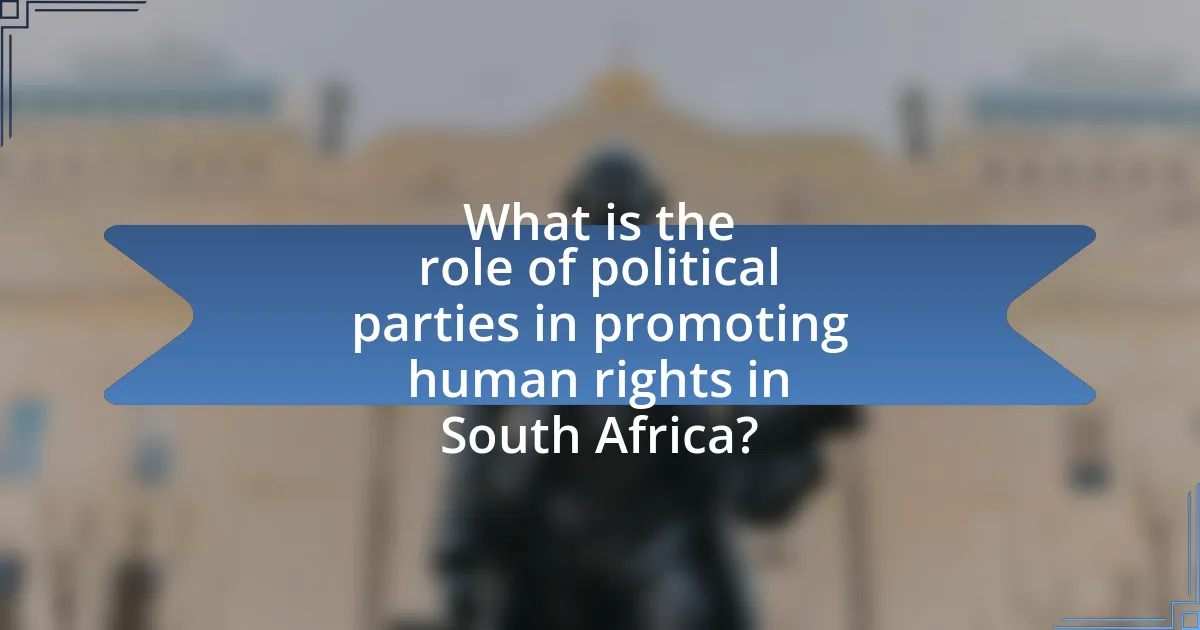
What is the role of political parties in promoting human rights in South Africa?
Political parties in South Africa play a crucial role in promoting human rights by advocating for policies that protect individual freedoms and social justice. They influence legislation, engage in public discourse, and mobilize citizens to participate in democratic processes. For instance, the African National Congress (ANC) has historically championed human rights through its commitment to the Constitution, which enshrines fundamental rights and freedoms. Additionally, opposition parties like the Democratic Alliance (DA) and the Economic Freedom Fighters (EFF) contribute by holding the government accountable and pushing for reforms that enhance human rights protections. Their participation in parliamentary debates and civil society initiatives further reinforces the importance of human rights in the national agenda.
How do political parties influence human rights policies in South Africa?
Political parties in South Africa influence human rights policies primarily through their legislative agendas, public advocacy, and participation in governance. The African National Congress (ANC), as the ruling party since 1994, has shaped human rights policies by embedding them in the Constitution and promoting laws that protect civil liberties, such as the Promotion of Equality and Prevention of Unfair Discrimination Act of 2000. Opposition parties, like the Democratic Alliance (DA) and the Economic Freedom Fighters (EFF), also impact human rights discourse by critiquing government actions, proposing alternative policies, and mobilizing public opinion around issues such as gender equality and land reform. Their debates and policy proposals in Parliament can lead to amendments in existing laws or the introduction of new legislation, thereby directly affecting the human rights landscape in South Africa.
What specific human rights issues are addressed by political parties?
Political parties in South Africa address specific human rights issues such as racial equality, gender equality, freedom of expression, and access to education. These parties advocate for policies that aim to eliminate discrimination based on race and gender, promote the rights of marginalized communities, and ensure that all citizens have the right to express their opinions freely. For instance, the African National Congress has historically focused on dismantling apartheid-era inequalities, while the Democratic Alliance emphasizes non-racialism and equal opportunities for all citizens. Additionally, the Economic Freedom Fighters prioritize economic rights and land reform to address historical injustices. These positions are reflected in their party manifestos and legislative agendas, demonstrating their commitment to human rights in South Africa.
How do political parties prioritize human rights in their agendas?
Political parties in South Africa prioritize human rights in their agendas by incorporating human rights principles into their policy frameworks and manifestos. For instance, the African National Congress (ANC) emphasizes social justice and equality, reflecting commitments to human rights as enshrined in the South African Constitution. Additionally, parties like the Democratic Alliance (DA) advocate for individual freedoms and anti-discrimination measures, showcasing their focus on civil liberties. Evidence of this prioritization can be seen in legislative efforts, such as the Promotion of Equality and Prevention of Unfair Discrimination Act, which aligns with party agendas aimed at protecting human rights.
Why are political parties essential for human rights advocacy in South Africa?
Political parties are essential for human rights advocacy in South Africa because they serve as platforms for policy formulation, representation, and mobilization of public support. Political parties influence legislation and government actions that protect and promote human rights, as seen in the post-apartheid era where the African National Congress implemented the Bill of Rights in the Constitution. Furthermore, parties engage in public discourse, raising awareness about human rights issues and holding the government accountable, which is crucial in a diverse society with varying interests and needs. Their ability to organize campaigns and advocate for marginalized groups enhances the visibility of human rights concerns, thereby fostering a culture of respect and protection for human rights across the nation.
What historical context shapes the role of political parties in human rights?
The historical context that shapes the role of political parties in human rights in South Africa is primarily defined by the legacy of apartheid and the subsequent transition to democracy. The apartheid regime, which lasted from 1948 to the early 1990s, institutionalized racial discrimination and severely restricted the rights of the majority black population. This oppressive system galvanized political parties, such as the African National Congress (ANC), to advocate for human rights and social justice, leading to their central role in the anti-apartheid movement. The negotiations that culminated in the 1994 democratic elections established a framework for human rights enshrined in the South African Constitution, which political parties are now tasked with upholding. The ANC, as the ruling party, has a significant responsibility to promote and protect human rights, reflecting the historical struggle against apartheid and the commitment to equality and justice for all citizens.
How do political parties mobilize public support for human rights?
Political parties mobilize public support for human rights by advocating for policies that promote equality and justice, engaging in public campaigns, and leveraging social media to raise awareness. For instance, the African National Congress (ANC) in South Africa has historically emphasized human rights in its platform, reflecting its commitment to addressing past injustices and promoting social equity. Additionally, political parties often organize rallies, community meetings, and educational programs to inform citizens about human rights issues, thereby fostering a culture of activism. Research indicates that parties that actively engage with civil society organizations can enhance their credibility and effectiveness in mobilizing support, as seen in various campaigns led by the Democratic Alliance (DA) focusing on anti-corruption and transparency.
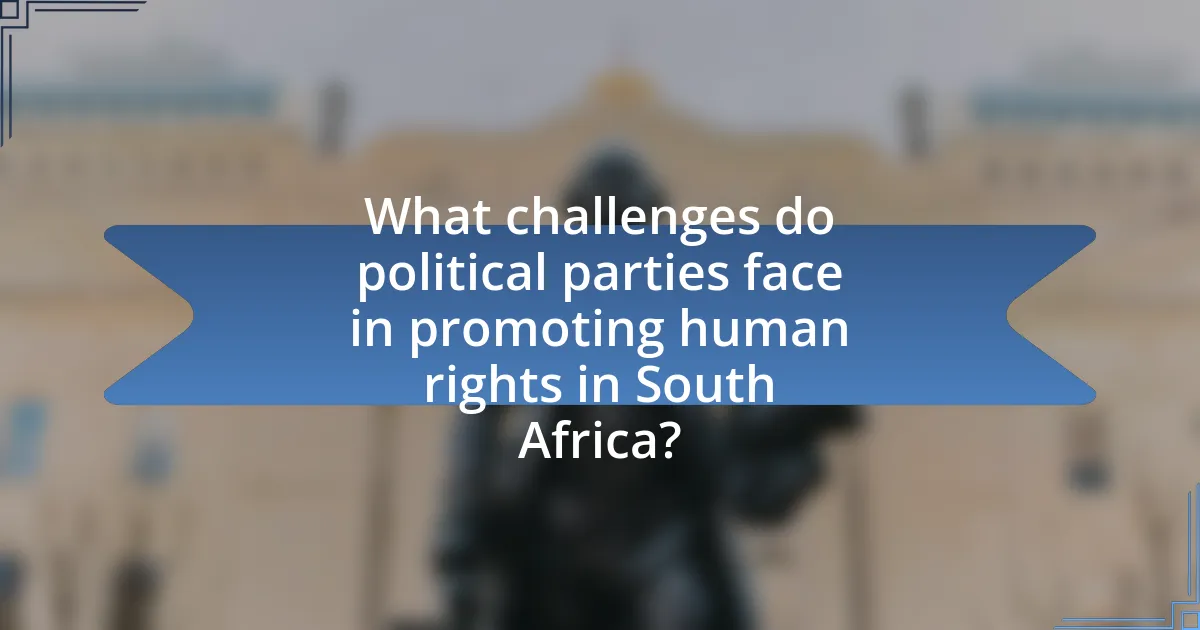
What challenges do political parties face in promoting human rights in South Africa?
Political parties in South Africa face significant challenges in promoting human rights, primarily due to political fragmentation, corruption, and socio-economic disparities. Political fragmentation leads to a lack of consensus on human rights issues, making it difficult for parties to present a unified front. Corruption within political structures undermines trust and accountability, hindering effective advocacy for human rights. Additionally, socio-economic disparities create an environment where marginalized communities struggle to have their rights recognized and protected, complicating the efforts of political parties to address these issues comprehensively. These factors collectively impede the ability of political parties to effectively champion human rights in the country.
How do internal party dynamics affect human rights advocacy?
Internal party dynamics significantly influence human rights advocacy by shaping policy priorities and resource allocation within political parties. For instance, factions within a party may either support or oppose human rights initiatives based on their ideological beliefs, leading to inconsistent advocacy efforts. In South Africa, the African National Congress (ANC) has experienced internal divisions that have affected its commitment to human rights, as seen in debates over land reform and social justice policies. These internal conflicts can dilute the party’s focus on human rights, resulting in a lack of cohesive action and diminished effectiveness in promoting human rights legislation.
What conflicts arise between party interests and human rights goals?
Conflicts between party interests and human rights goals often arise when political parties prioritize electoral gains over the protection of individual rights. For instance, parties may adopt populist policies that appeal to their voter base but undermine human rights, such as restricting freedom of speech or assembly to maintain control. Historical examples in South Africa include the African National Congress facing criticism for prioritizing political stability over addressing systemic human rights abuses, particularly during the transition from apartheid. This tension illustrates how party agendas can conflict with the broader commitment to uphold human rights, as seen in instances where political expediency leads to the marginalization of vulnerable groups.
How do leadership changes impact human rights initiatives within parties?
Leadership changes within political parties significantly impact human rights initiatives by altering priorities, strategies, and resource allocation. For instance, when a party undergoes a leadership transition, new leaders may prioritize different issues, which can lead to a shift in focus away from human rights initiatives if they are not aligned with the new leadership’s agenda. Historical examples in South Africa, such as the African National Congress’s (ANC) leadership changes, illustrate this dynamic; under different leaders, the party has fluctuated in its commitment to human rights, reflecting broader political strategies and public sentiment. Additionally, leadership changes can affect the party’s internal cohesion and its ability to mobilize support for human rights initiatives, as seen during the leadership transitions in the Democratic Alliance, where shifts in leadership have influenced the party’s stance on various human rights issues.
What external factors influence political parties’ commitment to human rights?
External factors that influence political parties’ commitment to human rights include international pressure, public opinion, and funding from external organizations. International pressure, such as sanctions or diplomatic relations, can compel parties to adopt human rights policies to maintain legitimacy and support. Public opinion, shaped by media coverage and civil society activism, can drive parties to prioritize human rights to align with voter expectations. Additionally, funding from international NGOs or foreign governments often comes with stipulations regarding human rights practices, further incentivizing political parties to commit to these principles. For instance, the influence of international human rights treaties and the scrutiny from global watchdogs can significantly impact how parties formulate their policies in South Africa.
How do public opinion and civil society shape party policies on human rights?
Public opinion and civil society significantly influence party policies on human rights by creating pressure for accountability and advocacy for specific issues. Political parties often respond to the sentiments expressed by the public, which can be gauged through polls, protests, and social media campaigns, leading them to adopt human rights policies that align with the electorate’s values. For instance, in South Africa, civil society organizations like the South African Human Rights Commission actively engage in monitoring human rights violations and mobilizing public support, compelling political parties to prioritize human rights in their platforms to maintain voter support. This dynamic is evident in the increased focus on issues such as gender equality and anti-discrimination laws, which have gained traction due to sustained advocacy from civil society and public demand for reform.
What role do international organizations play in influencing local political parties?
International organizations play a significant role in influencing local political parties by providing resources, expertise, and frameworks that shape political agendas and policies. These organizations, such as the United Nations and the African Union, often promote human rights standards and democratic practices that local parties may adopt to gain legitimacy and support. For instance, the presence of international observers during elections can encourage local parties to adhere to fair practices, as seen in South Africa’s post-apartheid elections, where international support helped establish a more democratic political landscape. Additionally, funding and training from these organizations can empower local parties to better advocate for human rights, thereby aligning their platforms with international norms and expectations.
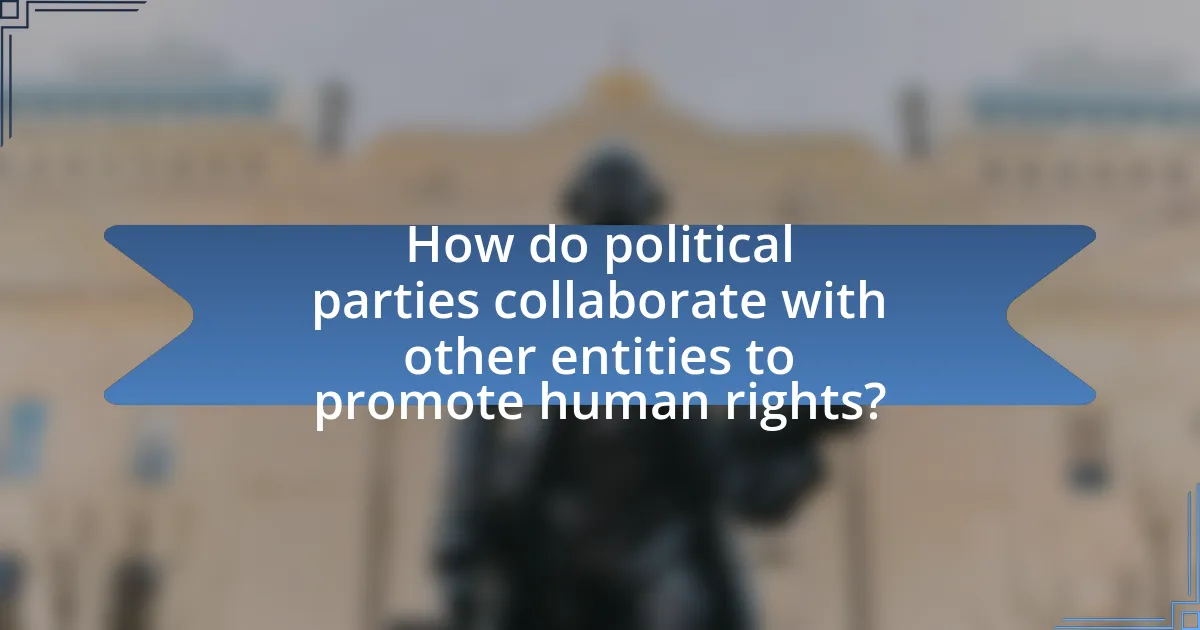
How do political parties collaborate with other entities to promote human rights?
Political parties in South Africa collaborate with various entities, including non-governmental organizations (NGOs), civil society groups, and international organizations, to promote human rights. This collaboration often involves joint advocacy campaigns, policy formulation, and public awareness initiatives aimed at addressing human rights violations. For instance, the African National Congress (ANC) has partnered with organizations like the South African Human Rights Commission to enhance human rights education and monitoring. Additionally, political parties may engage in coalition-building with other parties and stakeholders to strengthen legislative frameworks that protect human rights, as seen in the establishment of the South African Constitution, which enshrines fundamental rights and freedoms. These collaborative efforts are crucial for creating a unified approach to human rights issues and ensuring accountability in governance.
What partnerships exist between political parties and NGOs in South Africa?
In South Africa, partnerships between political parties and NGOs primarily focus on human rights advocacy, social justice, and community development. For instance, the African National Congress (ANC) collaborates with various NGOs like the Human Rights Commission to address issues such as inequality and access to basic services. Additionally, the Democratic Alliance (DA) has partnered with organizations like the Institute for Race Relations to promote policies aimed at economic freedom and social equity. These collaborations often involve joint campaigns, policy formulation, and community outreach programs, demonstrating a commitment to enhancing human rights and democratic governance in the country.
How do these collaborations enhance human rights advocacy?
Collaborations among political parties enhance human rights advocacy by fostering a unified approach to policy-making and public awareness. When political parties work together, they can pool resources, share expertise, and amplify their voices, leading to more effective campaigns for human rights legislation. For instance, in South Africa, the collaboration between various political entities has resulted in the establishment of comprehensive human rights frameworks, such as the Promotion of Equality and Prevention of Unfair Discrimination Act of 2000, which was influenced by collective advocacy efforts. This joint action not only strengthens the legal protections for human rights but also mobilizes public support, creating a more informed citizenry that can hold the government accountable.
What successful case studies illustrate effective partnerships?
Successful case studies illustrating effective partnerships in promoting human rights in South Africa include the collaboration between the African National Congress (ANC) and civil society organizations during the anti-apartheid movement. This partnership was pivotal in mobilizing grassroots support and international awareness, leading to the eventual dismantling of apartheid. Additionally, the partnership between the South African Human Rights Commission and various political parties has been instrumental in addressing human rights violations post-apartheid, ensuring accountability and promoting social justice. These collaborations demonstrate the effectiveness of alliances in advancing human rights agendas within the political landscape of South Africa.
How do political parties engage with the judiciary to protect human rights?
Political parties in South Africa engage with the judiciary to protect human rights by advocating for legal reforms, supporting litigation, and influencing judicial appointments. For instance, parties often propose legislation aimed at strengthening human rights protections and may collaborate with civil society organizations to challenge unjust laws in court. The African National Congress (ANC) has historically utilized its parliamentary majority to pass laws that enhance human rights, while opposition parties like the Democratic Alliance (DA) have taken legal action against government policies perceived as infringing on rights, such as the case of the DA challenging the constitutionality of certain provisions in the Electoral Act. These actions demonstrate how political parties actively participate in shaping the legal landscape to safeguard human rights in South Africa.
What legal frameworks support political parties in their human rights efforts?
Legal frameworks that support political parties in their human rights efforts in South Africa include the Constitution of the Republic of South Africa, 1996, which enshrines fundamental human rights and freedoms. This Constitution establishes the legal basis for political parties to advocate for human rights, as it guarantees rights such as freedom of expression, assembly, and association. Additionally, the Promotion of Access to Information Act, 2000, and the Promotion of Equality and Prevention of Unfair Discrimination Act, 2000, provide mechanisms for transparency and equality, further empowering political parties to engage in human rights advocacy. These legal instruments collectively create an environment where political parties can operate effectively in promoting and protecting human rights within the South African context.
How do political parties respond to judicial rulings on human rights issues?
Political parties in South Africa typically respond to judicial rulings on human rights issues by either supporting or opposing the decisions based on their ideological stance and political objectives. For instance, parties aligned with progressive values often endorse rulings that enhance human rights protections, while conservative parties may challenge or criticize decisions that they perceive as overreaching judicial activism. This dynamic is evident in cases like the Constitutional Court’s ruling on same-sex marriage in 2006, where the African National Congress supported the decision, reflecting its commitment to equality, while other parties expressed dissent, highlighting the ideological divides in responses to judicial rulings.
What best practices can political parties adopt to strengthen human rights promotion?
Political parties can strengthen human rights promotion by integrating human rights education into their platforms and training programs. This approach ensures that party members understand the significance of human rights and can advocate effectively for them. For instance, the South African Human Rights Commission emphasizes the importance of education in fostering a culture of respect for human rights, which can be reflected in party policies and campaigns. Additionally, political parties should actively engage with civil society organizations that specialize in human rights advocacy, as collaboration can enhance their outreach and effectiveness. Research indicates that parties that partner with NGOs are more likely to implement successful human rights initiatives, as seen in various democratic contexts globally. Furthermore, establishing internal mechanisms for accountability and transparency regarding human rights violations can reinforce a party’s commitment to these principles, as evidenced by successful practices in countries like Canada and Sweden.
How can political parties effectively engage with marginalized communities?
Political parties can effectively engage with marginalized communities by prioritizing inclusive dialogue and actively involving these communities in decision-making processes. This approach ensures that the voices of marginalized groups are heard and considered in policy formulation. For instance, research by the Human Sciences Research Council indicates that participatory governance enhances trust and cooperation between political entities and communities, leading to better representation of diverse interests. Additionally, outreach programs that focus on education and awareness about political rights can empower marginalized individuals, fostering greater civic participation and advocacy for their needs.
What strategies can enhance transparency and accountability in human rights advocacy?
Strategies that can enhance transparency and accountability in human rights advocacy include implementing robust monitoring and evaluation frameworks, fostering stakeholder engagement, and utilizing technology for data sharing. Monitoring and evaluation frameworks allow organizations to assess their impact and effectiveness, ensuring that resources are used efficiently and goals are met. Engaging stakeholders, including affected communities and civil society organizations, promotes inclusivity and ensures that diverse perspectives are considered, which strengthens accountability. Additionally, leveraging technology, such as online platforms for reporting and data visualization, enhances accessibility and transparency, allowing for real-time updates and public scrutiny. These strategies collectively contribute to a more accountable and transparent human rights advocacy landscape.
